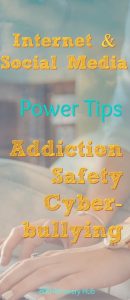What is Internet addiction?
Internet addiction is described as an impulse control disorder Some Internet users may develop strong attachments to online friends they create “virtually” on their computer. Internet users may engage in activities that allow them to mingle, socialize, and exchange ideas through the use social networking websites, and “virtual communities.” Other Internet users spend endless hours researching topics of interest Online or “blogging”. Similar to other addictions, those suffering from Internet addiction use the virtual fantasy world to connect with real people through the Internet, as a substitution for real-life human connection, which they are unable to achieve normally.
Social Media Addiction
A subset of computer addiction is social media. Social networking addiction is a phrase sometimes used to refer to someone spending too much time using Facebook, Twitter and other forms of social media — so much so that it interferes with other aspects of daily life. There’s no official medical recognition of social networking addiction as a disease or disorder. Still, the cluster of behaviors associated with heavy or excessive use of social media has become the subject of much discussion and research
Signs of Internet addiction?
- Euphoric Feeling when in front of the computer or the Internet
- Preoccupation with the Internet.
- Use of the Internet in increasing amounts of time in order to feel good.
- No sense of time – unable to keep schedules
- Repeated, unsuccessful efforts to control, cut back or stop Internet use.
- Feelings of restlessness, moodiness, depression, or irritability when attempting to cut down the use of the Internet.
- On-line longer than originally intended.
- Problems at work or school.
- Lies to family members, therapists, or others to conceal the extent of involvement with the Internet.
- Use of the Internet is a way to escape from problems.
- Depression, isolation, and feelings of guilt
Physical Symptoms of Internet Addiction
- Backaches
- Carpal tunnel syndrome
- Problems sleeping
- Blurred or strained vision
Causes of Internet Addiction
Some people may be predisposed to having a computer or internet addiction, such as those who suffer from depression or anxiety. Also, people who have a history of other types of addiction, such as to drugs, alcohol, and gambling. People who are overly shy and cannot easily relate to their peers are also at risk of developing a computer type addiction.
Solutions for Internet Addiction
Therapy can offer relief in controlling Internet use. One type is CBT (Cognitive behavioral therapy). It provides step-by-step ways to stop compulsive Internet behaviors and change perceptions regarding the Internet, social media, and computer use. Therapy can also help you learn healthier ways of coping with uncomfortable emotions, such as stress, anxiety, or depression.
Medications are sometimes needed to help with this kind of disorders. However, it is important to speak with a doctor regarding any potential side effects. As always, taking medication needs to be monitored.
If your child or someone you love suffers from an internet addiction, please call for help.
There are not many treatment centers that specialize in this disorder, but we can help you if you call.
If your Internet use is affecting your family member or friend directly, as with excessive cybersex or online affairs, marriage counseling can help you work through these challenging issues. Marriage counseling can also help you reconnect with your partner if you have been using the Internet for most of your social needs.
Internet Safety Tips
The Protection Connection
The Federal Trade Commission has put together some a portal called the Protection Connection. Here are some of their safety tips for teens. But, these apply to everyone.
There are lots of ways to be safe, and you’ve probably heard most of them: Look both ways before you cross the street. Don’t take candy from strangers. Don’t run with scissors.
Versions of those warnings exist for your life online, too. There are things you can do to protect yourself, protect your information (and your family’s), and your computer.
Protect Yourself
Use privacy settings to restrict who can see and post on your profile.
Many social networking sites, chat rooms, and blogs have privacy settings. Find out how to turn these settings on, and then do it. Limit your online friends to people you actually know.
Learn about location-based services.
Many phones have GPS technology, and there are applications that let you find out where your friends are — and let them find you. Set your privacy settings so that only people you know personally can see your location. Think about keeping location-based services off, and turning them on only when needed. Ask yourself, “Does this app need to know where I am?”
Trust your gut if you feel threatened or uncomfortable because of something online.
Tell an adult you trust, and ask for help reporting your concerns to the police and others who can help.
Dilemma
You’re online and an ad appears for a free game. It’s a game you’ve been wanting to buy, but you hadn’t saved up enough money yet. And here it is — for free. What do you do? Click download (because that would be so easy) and start playing? Check with your parents before you click? Skip it because it’s probably some kind of scam anyway?
Protect Your Information
Some information should stay private.
Your Social Security number and family financial information — like your parents’ bank account or credit card numbers — should stay in the family.
Keep your passwords private.
The longer your password, the harder it is to crack. Don’t share your passwords with anybody, including your best friends, your boyfriend, or your girlfriend.
Don’t reply to a text, email, or pop-up messages that ask you to reply with personal information.
Even if the message looks like it’s from a friend, family member or company you know, or threatens that something bad will happen if you don’t reply. These messages may be fakes, sent to steal your information.
Protect Your Computer
Learn about security software and how your home computer is protected.
Be cautious about opening attachments or clicking on links.
They may contain viruses or spyware.
Sometimes free stuff — like games, ringtones or screen savers — can hide viruses or spyware.
Don’t download free stuff unless you trust the source and can the file with security software.
Whether it’s your laptop, tablet or phone, don’t leave it in public — even for a minute.
If it goes missing, all the important information stored on it — like your messages and photos — may fall into the wrong hands.
Ask the Experts
Dear Expert,
I might be in trouble. I was playing on my dad’s computer and downloaded some stuff. (It was free, or I wouldn’t have.) Now he says his computer’s really slow and goes places he doesn’t want it to. Am I in trouble?Are you in trouble? That’s up to your dad. Is the computer in trouble? Probably. Some people claim to offer free stuff online — like videos, games, or ringtones — but when you download it, they secretly put harmful programs on your computer. It’s called spyware.
Spyware could search your computer looking for your credit card numbers or your bank account information. Or, it might copy everything you type in — even personal stuff — and send it back to a crook. And who wants that? So when you’re thinking about downloading something on to the computer, talk it over with your dad first. Think about whether it might be spyware in disguise.
Do You Download Apps?
If you do, you might be giving the app’s developers access to your personal information — maybe even info that’s not related to the purpose of the app. For example, say you download an app that lets you make a drawing out of a photo, but the company who made the app gets access to your entire contact list. It might share the information it collected with marketers or other companies.
You can try to check what information the app collects — if it tells you — and check out your own privacy settings. Also, think about whether getting that app is really worth sharing the details of your life.
Some apps cost money. And many free apps let you buy stuff from them — with real money. Check with your parents to make sure they’re ok with you buying additional features, especially if they’re paying the bill.
Share with Care
Think Before You Share
What you post could have a bigger “audience” than you think.
Even if you use privacy settings, it’s impossible to completely control who sees your social networking profile, pictures, videos, or texts. Before you click “send,” think about how you will feel if your family, teachers, coaches, or neighbors find it.
Once you post information online, you can’t take it back.
You may think that you’ve deleted a comment or a picture from a site — or that you will delete it later. Know that it may still be online or saved on someone else’s computer.
Get someone’s okay before you share photos or videos they’re in.
Online photo albums are great for storing and sharing pictures. It’s so easy to snap a shot and upload it instantly. Stop and think about your own privacy — and other people’s — before you share photos and videos online. It can be embarrassing, unfair, and even unsafe to send or post photos and videos without getting permission from the people in them.
